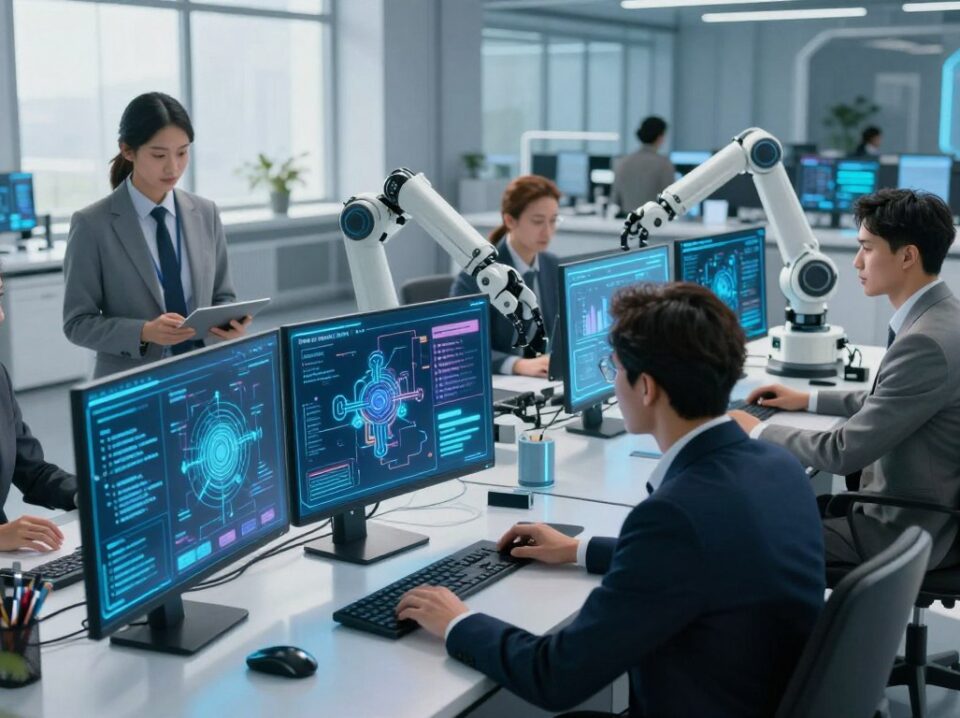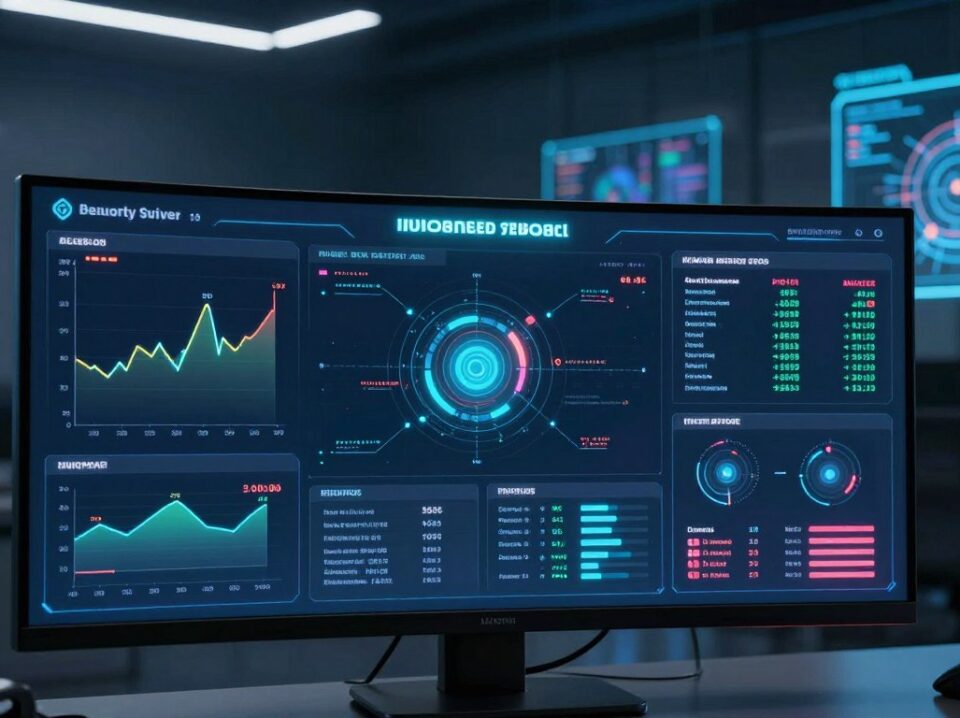Did you know that organizations lose an average of $5,600 per minute of downtime? For Chief Information Officers (CIOs), the stakes have never been higher. They are turning to autonomous reliability in IT systems to avoid this risk.
With digital infrastructure getting more complex, CIOs are looking for new solutions. They want autonomous technology that keeps services running smoothly and boosts efficiency. This need is fueled by high operational costs and intense competition online. It shows how critical it is to have systems that can handle today’s challenges and keep businesses running smoothly.
It’s clear that chief information officer reliability is key for success in our digital world. Brands are trying to use the latest technologies and improve their systems.
Key Takeaways
- CIOs are navigating significant financial losses tied to downtime.
- Autonomous reliability is essential for modern IT infrastructures.
- Organizations seek innovative technologies to address rising operational demands.
- Continuous service is vital for business continuity and market competitiveness.
- Effective IT solutions enhance agility within a dynamic market landscape.
The Rising Necessity for Autonomous Reliability in IT
In today’s fast-changing digital world, IT systems need autonomous reliability more than ever. Companies face the risk of downtime, which can cause huge problems. Understanding these risks helps businesses use autonomous solutions to keep their operations running smoothly.
Understanding the Impact of Downtime on Businesses
Downtime means big problems for any business. Studies show 98% of companies face downtime each year. This can cost a lot, with IBM saying a data breach can cost $4.45 million.
Downtime also hurts a company’s reputation and makes customers lose trust. So, having reliable CIOs is key. They can plan ways to reduce downtime and its effects.
How Autonomous Reliability Enhances Business Continuity
Using autonomous reliability in IT makes businesses run better. It uses smart analytics and learning to find and fix problems early. This makes companies more agile and able to meet customer needs quickly.
This approach also helps CIOs lead more responsive and strong IT systems. It’s all about being ready to handle any situation.
| Downtime Impact | Financial Loss | Reputation Risk | Operational Strain |
|---|---|---|---|
| System Outage | $300,000/hour | Severe | High |
| Data Breach | $4.45 million | Significant | Moderate |
| Customer Loss | $100,000/year | High | Low |
CIOs Want Autonomous Reliability
CIOs face big challenges in making IT systems reliable. There’s a big talent gap in AI skills. Large companies struggle to find people with these skills, with 76% facing this issue.
Adding new AI solutions to old systems makes things even harder. This adds to the cio challenges in achieving reliability. Also, data privacy laws can slow down the use of new tech.
Challenges in Achieving Reliable IT Systems
- Talent shortages in AI capabilities
- Difficulties in integrating with legacy systems
- Compliance and data privacy issues
Strategic Importance of Autonomous Solutions
Despite the hurdles, autonomous solutions are crucial. They help make IT systems more efficient and handle today’s IT complexities. CIOs gain a lot by focusing on autonomous reliability.
This approach leads to better IT governance and faster response times. It’s a key strategy for success.
Transformative Role of Agentic AI in IT Reliability
Agentic AI is changing how IT reliability works for today’s companies. This new tech lets systems work on their own, making things more efficient and accurate. With autonomous solutions for cio reliability, businesses can handle risks better, making their operations stronger.
What is Agentic AI and Its Significance?
Agentic AI is a big step up from old automated systems. It can think, plan, and decide on its own, without people. This new tech helps solve problems faster and keeps systems ready for new IT challenges.
Real-World Applications of Agentic AI in IT
Companies using agentic AI see big changes in many areas. It helps with supply chains and makes customer interactions better. For those using modern cio reliability strategies, AI makes things run smoother and faster. For example, AI agents can make responses up to 40% more accurate.
Modern CIO Reliability Strategies
Modern CIOs are now using a mix of old and new ways to make their IT systems better. They blend AI that works on its own with the watchful eye of skilled people. This mix aims to build strong systems that help companies grow and stay in line with rules and quality.
Implementing Hybrid Approaches for IT Systems
Hybrid methods find a middle ground between new tech and human know-how. AI helps with tasks like IT support and DevOps, freeing up people for more important work. Pilot projects are key here, helping CIOs see what works best and make things better.
Evaluating the Effectiveness of Current IT Tactics
Companies need to check their IT plans often to make sure they’re up to date. Looking at how well these plans work shows what’s good and what’s not. Things like how well things work, how much money is saved, and how happy users are help guide future choices.
By following these steps, CIOs can help their companies stay ahead in the fast-changing tech world. This ensures a strong future for them.
| Strategy | Description | Benefits |
|---|---|---|
| Hybrid Approaches | Combining AI automation with human expertise | Increased efficiency and enhanced oversight |
| Pilot Programs | Testing AI on low-risk tasks | Reduced risk and improved integration |
| Performance Metrics | Assessing outcomes against set benchmarks | Informed decisions and targeted improvements |
Overcoming Challenges in Achieving CIO Reliability
To successfully use autonomous technology for CIOs, organizations face many challenges. These challenges are especially true in data privacy and compliance. With stricter rules, CIOs must make sure their systems follow these rules.
Addressing Data Privacy and Compliance Concerns
Companies are under more pressure to manage their data well. They need strong plans to handle privacy and compliance issues. This means:
- Creating detailed data governance plans.
- Doing regular checks to keep things fair and open.
- Setting up human checks to review automated choices.
These steps are key to building trust and following laws like GDPR and CCPA.
The Need for Talent in Implementing Autonomous Solutions
Using autonomous technology needs people with the right skills. There’s a big gap in talent, which is a big problem. Companies are now focusing on:
- Teaching current staff about data privacy.
- Helping employees learn more about using autonomous tech.
- Finding people with special skills in AI and rules.
Filling this talent gap is crucial for CIOs to fully use autonomous technology.
Conclusion
The need for autonomous reliability is changing how CIOs handle IT. They look for new ways to tackle today’s business challenges. Using agentic AI and other tech, they can stay ahead, making their operations better.
This change helps CIOs reduce downtime risks and improve efficiency. By adopting these advanced solutions, companies can get ready for the future of tech. This move is a big step towards sustainable growth and excellence in operations.
As CIOs focus more on autonomous reliability, the future of IT looks bright. It opens up new ways for companies to handle changes and find new chances in a fast-paced world.
FAQ
What is autonomous reliability in IT systems?
Autonomous reliability means IT systems can run on their own. They don’t need humans to keep going. This makes things run smoother and keeps businesses going.
Why are CIOs prioritizing autonomous reliability?
CIOs want to avoid system failures and high costs. They also want to meet customer needs better. This boosts business speed and trust with customers.
What are the main challenges CIOs face in achieving reliable IT systems?
CIOs struggle with finding AI experts, merging new tech with old systems, and keeping data safe. These issues make it hard to keep IT systems reliable.
How does agentic AI enhance IT reliability?
Agentic AI lets systems think and act on their own. This makes operations, supply chains, and risk checks much better. It brings big efficiency gains.
What are some real-world applications of agentic AI in IT?
Agentic AI helps with day-to-day tasks, talking to customers, and fixing problems. It makes things more efficient and accurate.
How are modern CIOs implementing hybrid strategies for IT reliability?
Modern CIOs mix AI with human checks. They start small with AI for simple tasks. This helps them see how well it works and if it’s worth more.
What steps can organizations take to address data privacy and compliance challenges?
Companies can check for bias, have humans review data, and follow strict data rules. This helps solve privacy and compliance issues with AI.
Why is there a need for talent in implementing autonomous solutions?
You need people who know AI and its impact on rules and data. They help make sure AI works right and safely.




